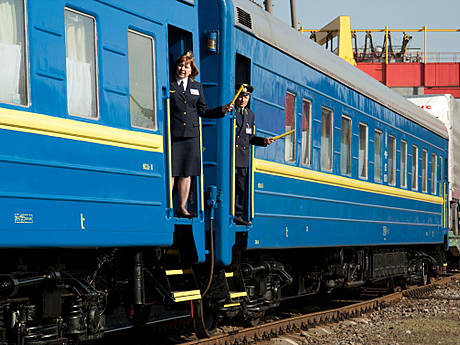
The Ukrainian Railways (Ukrzaliznytsia), which is in a plight at the moment, may get an opportunity to upgrade 80-90% of its old rolling stock by engaging Ukrainian-based machine-building enterprises. This initiative put forth by the business community – the Anti-Crisis Council of NGOs, the Ukrainian League of Industrialists and Entrepreneurs (ULIE), a number of professional associations – was supported at a visiting session of the National Committee for Industrial Development in the town of Kremenchuk. The event was attended by Ukrainian Prime Minister Volodymyr Groysman, Minister of Economic Development and Trade Stepan Kubiv, as well as other ministers, ULIE leaders, top managers of Ukrzaliznytsia, Kriukov railway car building works, Azovmash, and others.
Having visited the works and examined its problems, Committee members agreed to draw up a state program until 2021 for the procurement of new rolling stock for Ukrzaliznytsia. It is scheduled to be approved as early as in the first quarter of 2017.
"Thus, the initiative of the Ukrainian industrialists and entrepreneurs has been heard. The state has an opportunity to introduce concrete mechanisms to support domestic enterprises in the machine-building sector and maintain jobs for skilled workers, streamlining rail transport operations. Further ignoring these problems could translate into a complete loss of personnel, technological capabilities, and lead to a halt to the whole industry," member of the Committee, ULIE President Anatoliy Kinakh has said.
The ULIE and business associations have repeatedly pointed to the critical situation in transportation by rail. The lack of freight cars has jeopardized key domestic industries. Losses for producers and exporters reach $70-80 million each month. Thousands of tonnes of freight lay idle each day.
For example, transport operations in the mining and metallurgical complex have fallen by almost 10%, which resulted in a reduction of steel production by at least 200,000 tonnes and a decline in the country's foreign currency revenues by $70 million per month.
At the same time, manufacturers of transport equipment also sustain significant losses. For example, Kriukov railway car building works saw a decline in production by 85.7% compared to 2011, and its workforce more than halved.
Under such circumstances, the elaboration of the Ukrzaliznytsia program and the prioritization of innovative products of domestic producers for procurement tenders (as decided by the Committee) could become a significant step towards solving the most pressing issues.
"While conducting tenders, we can rely on EU experience in protecting national producers, namely the level of localization of production, economic efficiency of equipment and others. This means in practice that if a Ukrainian product has good specifications, the difference in the price can be in its favor within certain percentage limits. At the moment, we speak about 15%, the Committee is now working on this issue," the ULIE leader said.
Further, Anatoliy Kinakh announced a number of meetings scheduled between the Economic Development and Trade Ministry and representatives of metallurgical and machine-building enterprises on the principles of setting prices for their products in the domestic market.
Producers are also set to export their produce. In particular, on the agenda are talks with representatives of trade missions and embassies of the countries that are interested in Ukrainian-made products.
What is more, the first tenders to order and purchase electric and diesel locomotives are scheduled as early as in the first quarter next year.
"Now everything depends on the consistency and efficiency of the government, its willingness to rely on the support of producers who are ready to launch their production facilities at full capacity. We hope that the National Committee for Industrial Development will give impetus to the domestic industry, will set an upward trajectory for modernization," Anatoliy Kinakh concluded.